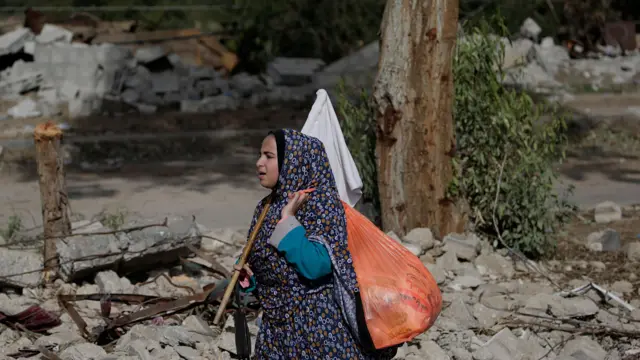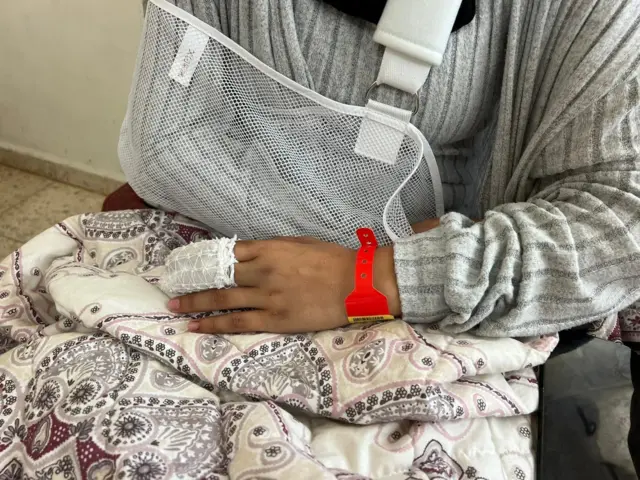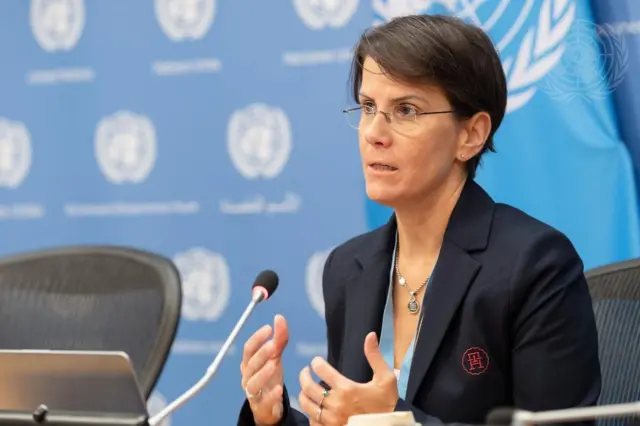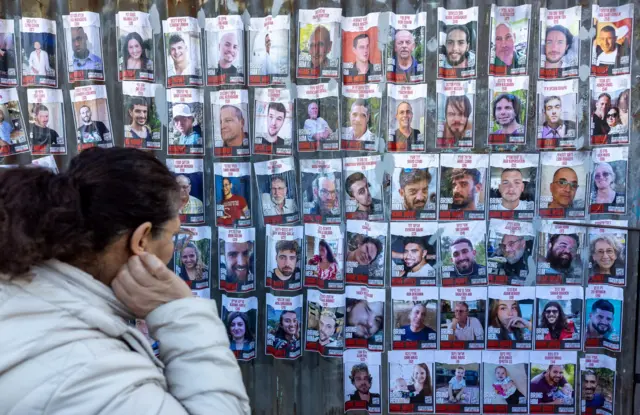“How did the war in Gaza become a war against women?” – Press tour – BBC News Arabic

image source, EPA
In the press release, we discuss prominent newspaper reports about the suffering of women as a result of the ongoing war since October 7, and its impact on women in the Gaza Strip and the West Bank.
We begin with an article published by The Independent newspaper that highlights the difficult situation women and girls in Gaza face, particularly in relation to reproductive health and menstrual problems. , pregnancy and childbirth.
Secretary, Dr. Israa Saleh, a sexual and reproductive health specialist at the French organization Médecins du Monde in Gaza, describes her personal and professional experience in providing health care to women in Gaza amid conditions of the difficulties they face.
At the beginning of this article, Dr. Israa Saleh describes the daily struggles women in Gaza face in managing their periods due to deprivation and constant violence. He says: “There are about 700,000 girls and women of childbearing age in Gaza, in addition to the thousands of girls who started menstruating during the war in Gaza.
Dr. Israa compares the lives of women in Gaza to women in other parts of the world, noting the huge disparity in living conditions and health. “Girls in Gaza face huge challenges when they enter puberty and start menstruating for the first time.”
In his article, Dr. Israa emphasizes “the health and psychological problems that women face in Gaza due to the lack of health facilities and basic goods such as water, soap and sanitary pads, which can lead to isolation and oppression of the mind.”
Dr. Israa adds in her article, “There is immaturity in the mind and in the living things, weakness and understanding when a person enters manhood or womanhood, in addition to the constant feeling of insecurity, tension and painful loss.” She emphasized, “Menstruation makes it more difficult.”
Dr. Israa concludes the article by noting that “ongoing wars, forced displacement and restrictions on aid and health products make normal aspects of life such as menstruation, pregnancy and childbirth a constant battle.”
“Were those women spies?”

image source, Arab48
In an article published in the Israeli newspaper Yedioth Ahronoth, by writer Einav Schiff, the writer talks about the attack on four Palestinian women with Israeli citizenship who were carrying a child, in an illegal settlement called Givat Ronen .
The author says, “This event was expected to trigger a wave of criticism from politicians and public leaders, but the responses came late and were not clear, showing public indifference to such crimes.”
Regarding this incident, the author explains that the women from the village of Rahat were attacked by many people in a remote residential area.
He continued, “The sisters missed the road to the city of Nablus, and accidentally entered the village of Givat Ronen, near the town of Huwwara, near Nablus. When they entered, the foreigners blocked the road in front of them, throwing stones at them. , and pointed weapons at them and at the child, who was no more than three years old. The immigrants also set fire to the car, while the child was still inside, while the sisters were being attacked.
The author states that the sisters suffered wounds and fractures in different parts of their bodies, due to the attack of the foreigners, “who chased the sisters between the trees after burn their car.”
The author explains that “the attack included threats with weapons, throwing stones and burning a car, which caused serious injuries to the women who had to be hospitalized.
The author criticized “some words that defend the attackers, such as Representative Limor Son Harmelech, of the Otzma Yehudit Party – led by Itamar Ben Gvir – considering that the women who were attacked were (possible spies) ,” simply because they visited where they did not expect. a place of residence.
The author believes that “the accusations were too little and too late, in other words he continued to support the behavior of the immigrants.”
The author expresses his concern, “Despite the serious incident, there has been no arrest of the attackers so far, which raises concern and confirms the reluctance of the authorities to face these crimes completely. “
The author states that “the media coverage of this event was limited, as it did not receive enough attention in the mainstream media.”
The author refers to the statements of Major General Yehuda Fuchs, the former commander of the Central District in the Israeli army, who recently warned of the increase in crimes “motivated by the state” and called for a firm fight.
The author explains, “Political leadership in the villages continues to avoid their responsibilities and choose to be inactive instead of taking a strong stance against violence, which puts the community in a weak position does not address these ongoing violations.”
At the end of this article, the author shows how “the inconsistent roles of political leaders and law enforcement agencies in such events show a serious problem in dealing with the issues of violence committed by immigrants.” He emphasizes that this incident “requires more criticism and pressure to end these frequent crimes against the Arab population, especially in areas that are considered illegal settlements.”
“Israeli forces systematically and violently attack Palestinian women” – UN report

image source, Photo
In his report published on the Middle East Mentor website, author Anjuman Rahman highlights what Reem Al-Salem, the UN Special Rapporteur on violence against women and girls, said “about the horrific crimes committed by the forces of Israel against Palestinian women.”
The report says, “Israeli soldiers systematically and violently attack Palestinian women.”
The report said that the crime includes “killing and torture in the field, as Palestinian women are brutally killed and tortured.”
The report confirmed that the UN reporter reported the presence of “sexual assaults, including rape and sexual torture.”
The report states that “the crime involved taking pictures of women in indecent conditions and sharing these pictures between soldiers and foreigners as part of a strategy of intimidation and humiliation.”
The report touched on the term (reproductive violence), “which refers to the destruction of Palestinian women’s basic structures and their reproductive capacity by focusing on everything related and delivery and postpartum care,” according to the report.
The report said that many women were detained in “inhumane” conditions. The report quoted Reem Al-Salem, “Some soldiers boast of displays of abuse, such as collecting Palestinian women’s clothes as spoils of war.”
The report believes that “these crimes go beyond the limits of military conflict,” stating that “their impact on Palestinian women forms part of a wider strategy that seeks to humiliate and destroy human dignity. ” which are not appreciated enough.”
“Psychological and physical characteristics of Israeli mothers released from Gaza”

image source, Reuters
The Israeli newspaper Haaretz published an article by author Ido Afrati, highlighting an investigation conducted by the Schneider Children’s Hospital on the 26 women and children kidnapped by Hamas on October 7.
The author says, “The study reveals serious consequences that include weight loss, psychological trauma, problems caused by poor hygiene or shrapnel injuries, and infections.”
The author adds, “The results of the study, published in the journal Acta Pediatrica, show that the released captives lost weight and digestive problems, and that their nutritional status during captivity it was very poor, and that the loss of body weight was more visible in older women.”
The author says, “In addition to malnutrition and weight loss, the researchers reported problems related to good hygiene, especially among those who were in the tunnels. , including lice and insects.
The author stated that the conditions of detention had a negative impact on the underground prisoners during most of the detention period. “Many also reported limited access to tap water throughout their captivity.”
The author said, “All the captives were psychologically evaluated and received social and psychological support while in the hospital. They all reported being exposed to psychological terror, with the use of psychological warfare techniques that included Isolation, intimidation, withholding food and water, and psychological abuse.” As the report said.
The author explained, “The study reported that three women and teenagers who received treatment with anti-anxiety medication during captivity one of the women who had previously suffered from a mild anxiety disorder developed worsened during detention, and reported that she had received short-term tranquilizing pills at random times during her detention. has symptoms of Stockholm Syndrome, according to the report.
#war #Gaza #war #women #Press #tour #BBC #News #Arabic